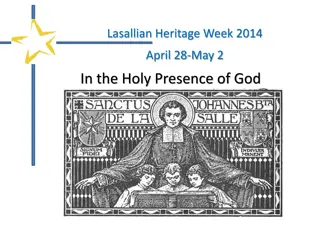
Historical Perspectives on Climate's Impact on Health
Explore how perceptions of climate's influence on health evolved from the 18th to early 20th centuries, ranging from ideas of acclimatization to debates on white populations thriving in tropical regions. The works of Katherine Johnston, Dane Kennedy, and David Livingstone shed light on the shifting views on human acclimatization in various disciplines.
Uploaded on | 2 Views
Download Presentation

Please find below an Image/Link to download the presentation.
The content on the website is provided AS IS for your information and personal use only. It may not be sold, licensed, or shared on other websites without obtaining consent from the author. If you encounter any issues during the download, it is possible that the publisher has removed the file from their server.
You are allowed to download the files provided on this website for personal or commercial use, subject to the condition that they are used lawfully. All files are the property of their respective owners.
The content on the website is provided AS IS for your information and personal use only. It may not be sold, licensed, or shared on other websites without obtaining consent from the author.
E N D
Presentation Transcript
Disease and the Environment
Overview Understandings of the climate s impact on health in the 18th, 19th early 20thcenturies took a world, regional, and local approach. Settler experiences varied based on region resulting in both physiological and behavioural ideas of acclimitisation.
Katherine Johnston, The Constitution of Empire: Place and Bodily Health in the Eighteenth-Century Atlantic, Atlantic Studies 10 (2013), 443-466 Health was important in deciding where to live in the colonies, and this was susceptible to change over time as individuals experienced the climate first-hand. The 18thcentury saw colonists consider microclimates , creating the idea of different climates within one colony, such as Jamaica. British-born individuals sometimes preferred the West Indian weather over England s, but this was believed to require the body to go through seasoning . Not all British constitutions were the same, and while some individuals could adjust, or season , to the tropical weather, others could not. The 17thcentury saw more negative views about the climate persist, but in the 18thcentury more nuanced views of climates emerged that factored microclimates into consideration of a place s health. P. 444-445 Rather than seeing tropical climates as uniformly unhealthy for British bodies, planters and other colonists believed that different places had varying degrees of health, and that some of these places could in fact be healthy locations for people to settle.
Dane Kennedy, The Perils of the Midday Sun: Climatic Anxieties in the Colonial Tropics, in John M. MacKenzie (ed.) Imperialism and the Natural World (Manchester, 1990), pp.118-140 In 1905, Woodruff suggested that actinic rays were more harmful depending on the pigmentation of the skin, leading him to conclude that white people could not acclimatise to tropical climates. P. 121 While medical researchers from the late nineteenth century onwards did make great advances in the struggle against tropical disease, their achievements did not automatically sweep away suspicion that the climate itself posed biological harm to Europeans. By contrast, Weston Chamberlain suggested that microbes were the cause of most illnesses in the tropics. The question of white people living in the tropical climates was still a concern in the 1920s and 1930s. Queensland Australia was an example of a white population thriving in a tropical area, creating a contrast with those who believed white Europeans could not acclimatise to tropical climates. Climatic theories declined after World War Two, as white European soldiers fought in tropical places across the world without constantly suffering neurasthenic illnesses.
David Livingstone, Human Acclimatisation: Perspectives on a Contested Field of Inquiry in Science, Medicine, and Geography, History of Science 25 (1987), 359-394 The topic of acclimatisation was prevalent across many disciplines, such as geography, medicine, zoology and anthropology. Universal anti-acclimatisation, that humans could not acclimatise to any other climate, was favoured by many during the 19th and 20th century. Acclimatisation was debated and often contrasted with regards to plants and animals ability to acclimatise. Imperialism could play a role in shaping people s views on acclimatisation. The monogenist-polygenist debate also influenced whether people supported or rejected acclimatisation. P. 384 Still, as a broad generalization, there are indications that a pro- acclimatization stance was adopted by those favouring colonial settlement overseas, while anti- acclimatization was held by those focusing on the economic exploitation of the tropical world.
Mark Harrison, "The Tender Frame of Man": Disease, Climate, and Racial Difference in India and the West Indies, 1760 1860, Bulletin of the History of Medicine (1996), pp.68-93 P. 70 "Concepts of racial immunity varied considerably over time and between contemporaries, and reflected the contradictions arising from colonial domination. Shifting power relationships in the colonies, together with new intellectual currents emanating from the metropole, wrought a profound change in the way Europeans came to see their bodies in relation to their subjects and the tropical environment." European reactions to the tropics varied, often distinguishing between healthy and unhealthy localities. Eighteenth century European scholars systematically studied Indian medical practices, recognising similarities with Western medicine. Hunter s monogenist theory linked immunity to acclimatisation, viewing physical adaptation as climate-influenced and shaped by cultural practices. Climatic determinism encouraged optimism about European settlement in the tropics. Both monogenist and polygenist theories were used over time, with varied emphasis based on imperial motives.
Karen Kupperman, Fear of Hot Climates in the Anglo-American Colonial Experience, The William and Mary Quarterly (1984) , pp. 213- 240 Early colonists exaggerated fears of hot climates, mistakenly expecting extreme heat due to geographic misunderstandings. Europeans believed they could endure tropical climates with proper adaptation, viewing high mortality as a challenge of adjustment rather than a sign of incompatibility. Humoral theories of the 18th century linked climate and health tightly, with humid environments believed to destabilise bodily humors. Despite health risks, most English settlers chose warmer colonies, relying on strategies like reduced labor for new arrivals and fall immigration to aid acclimatisation. 18th century settler commitment meant that their accounts of conditions were skewed in comparison to 17th century earlier settler accounts. P. 213 - "The settlers' health fared badly in both the southern mainland colonies and the West Indies [and] contributed important evidence that hardened generalized anxieties into medical dogma by the eighteenth century. The link between weather and disease then became axiomatic."
Historiography -While Johnston focuses on the climate and health in the colonies themselves (particularly the West Indies) and the individuals living there, Kennedy and Livingstone focus instead on Western concepts of the climate, specifically on acclimatisation. -Harrison emphasises the change in relationship between disease and race over time through the context of slavery, it's abolition and British settlement in India, whereas Kupperman focuses on settler experience and adaptability issues based on preconceived expectations.
Questions To what extent did Hippocratic theories influence medical theories regarding climate and health in the 18th and 19th centuries? How would you explain the link between British Imperial concerns and the monogenist/polygenist ideas in 18th and 19th-century medical writings?






















